RED SNAPPER INTERVIEW
home
News
New Reviews
Reviews Archive
Interview Archive
Hall Of Fame
Links
Contact

- Red Snapper's Ali Friend
- We used this synth line in it that we gated really hard to give it a rhythmical pattern. And that is off their original, it's like an accordion line but we reversed it and put a heavy phase and reverb on it. That is what we got out of it. But it works really well. Playing it out works really well.
- And he eventually had to make that decision to go one way or the other. And fortunately he did the right thing, he went with Snapper because it's a more progressive and unusual sound that has greater possibilities, do you know what I mean? It can pretty well go anywhere and because we've always tried to be experimental I think that people accept that each tune we do can be completely different. People don't always expect to hear the same thing, so. But he had to jack in The Aloof.
I've been checking out your music since your early EP with the Andy Weatherall remix.
That came out in 1994 on Flaw Records, a tune called "Hot Flush." It was the Sabres Of Paradise that remixed, and he was obviously a part of them. And more recently he did "Bogeyman" which was the first single off of Making Bones. It came out in Britain about a year ago.
You are involved with a couple of anniversaries. You are now in New York for the Matador label party, and there is also Warp's 10th Anniversary. You guys did a remix of the Sabres Of Paradise track "Wilmot" for the Warp Remixes collection, was that left over from a few years ago or a new thing?
It is a completely new thing. It is one of those tunes which is quite inspiring for us, from back in the day, we always liked it. Basically Warp just asked all the artists to mix one of the tunes on the label, and we just thought about that one. It was a real risk to do it because it is such a seminal track, if you like, in your head. But we thought we'd give it a go, and it came out really well.
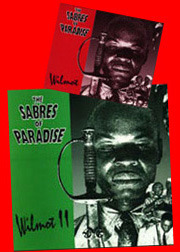
"Wilmot" was a wild track. Were those horns some kind of carnival or New Orleans music?
I think they sampled the horns off an old mariachi tune by a bloke called Wilmot somebody-or-other Hellford. Hence the title "Wilmot." It was an old sort of brass line, really.
I wondered about that title because there was a writer at NME named Ben Wilmot and I didn't think they were dedicating a tune to him.
(laughs) He'd love it if they were. I know him, yeah. He was never a great fan of ours.
Why was that?
I'm not sure. I don't he liked the jazz in it much. I think he preferred things straighter. But, you know, we get on all right now. (laughs)
Now that you are on the charts he'll pay attention to you.
Tell me about remixing "Wilmot," you've got processed keyboard sounds, and the funky bass kick as a stripped-down beat at the beginning there.
Yeah. We kind of approached it the way we always approach our remixes, in that we listen through to the original and there are always certain parts of it which we like. And we take those and we tend to build up a tune up around that. We always try and impose a Snapper feel on our mixes which pretty well inevitably means that I come up with another bass line on the double bass and put that over it. Very often we use bits of Richard's drums, you know, like outtakes and bits we've never used properly and chop them up and play around with them. And then just add bits on top of that.
At one point Richard was playing with Sabres Of Paradise, so how was his time divided up between the bands he was in?
What, with the Sabres and Aloof and everything?

Yeah. Well, with the Sabres he was just doing live percussion at gigs here and there. And then with The Aloof he worked - I played live with The Aloof as well - so at one point it got very stretched when both bands started to get a lot more attention and needed to do a lot more work.
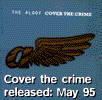
Were you guys guests in The Aloof?
Well Richard was actually a member of The Aloof. And I guested live-wise and did a bit of writing with them. That was about it, really.
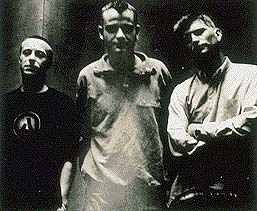
Which of you guys were the founders of Red Snapper?
It is really David, myself and Richard. I mean, Richard and I got together to make a drums and double bass breaks album. And we used to meet up and jam and come up with mainly hip hoppy grooves with double bass bits over top. And we knew David and this other guy Allan Riding, who played sax and flute and so on (who left to become Obo). And it was so easy. We all just used to meet up in the rehearsal room and have a laugh, really. And then we realized that things were actually starting to sound very unusual. And then putting out the first EPs on Flaw - again that was kind of "it'd be really nice to have things on vinyl." And it just kicked off, so. But yeah, the three of us are the core and have been all the time. And then we bring other people in.
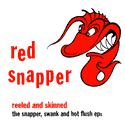
What was the breaks album you mentioned?
The breaks album kind of ended up as the first three EPs (collected on Reeled & Skinned, Warp). The drum and bass grooves we had we converted into tunes, so the actual breaks album never came out. Which was a shame. It is something we talk about doing even now, because it would be quite interesting. But there is so much double bass out at the moment. Everyone is using double bass so it wouldn't be as interesting now, say as in 1993 when we were doing it.
It was an exciting time in 1994 when the Mo Wax sound was getting noticed. You guys had your first records out when people were looking for the new style of breaks.
Yeah, definitely. That time was the most inspiring time. And also a lot of the hip hop that was coming out then, the really stripped-down hip hop, like the Eric B & Rakim stuff, I found incredibly exciting at that time. Really simple grooves going on. That's what really inspired us. The stuff that was coming out seemed so simple but so interesting at the same time. We'd all done jazz in the past, and I think the problem with jazz is that it can get too complex. And it can just become too much about what you are doing rather than why you are doing it. So the whole idea of a very simple version was appealing and it opened it up for a lot more people.
For me it was an aesthetic where people were sampling musicians and not having the self-indulgent side of live playing.
Completely, yeah. Particularly Rich and myself we've always tried to imitate a break or a loop. We record ourselves and then sample ourselves and you try and get a real atmosphere and a real hardness just off of two or four bar loops. The great thing is that no one else can get that. It is not available to anyone else. It's our own and that is what makes it exciting. Also means we can do it live, which is an equal part to us, really. Being able to play live, you can't really beat it, particularly because it never sounds the same the way we do it. (laughs)
Now what I've noticed is that the people who started off as samplers have gotten to be better musicians and you have groups coming along like The Egg who are like almost progressive rock.
Yeah.
And it is getting back into the band-style acid jazz, and losing that cut & paste aesthetic that was there originally.

Yeah, I think that is true. I don't know if the acid jazz thing would be able to take off again. It is a problem as soon as you do things live, when you try and create that dance music live. Particularly with the sorts of instruments we use, you can't help but think it is going that way. But we are definitely trying to keep it harder and sparser than a lot of that. And not layer it up too much.

- In the last five years... people have been playing live off a couple of consoles, you know, with a little mixing desk on stage, two blokes twiddling their knobs. And that's cool, I think people should do that if they want to, but I think punters are starting to get a bit bored with that. And they want to see a live band, which can't help but be more exciting because you've got people communicating with each other on stage. And people going off the wall a bit more. Ultimately you are restricted if you are just playing off samplers.
Any chance you've heard this new Carl Craig album?
I have heard bits of it yeah. I like it.
With some of that he is trying to go back to the fusion of the '70's.
That's right.
And he's taking a risk, I feel, because here's someone who is a studio guy who is now trying to catch up to twenty/thirty years of live playing which is not going to happen over night.
No completely. Unless you have a real take on it, a real angle on it, there is almost no point in doing it. I see no point in people doing that unless they have a strong idea. But I do like the bits I've heard. I think I've heard half the album. Somebody played it on the tour bus. But yeah, you have to be careful with the whole fusion thing. I loved a lot of fusion in the late '80's but...be careful.
He's got one track with an electric violin on it that sounds like Jean-Luc Ponty to me, and another with quiet electric piano that could be Camel or something like that. And Carl Craig is a younger guy who may not know that all these sounds have happened before.
Yeah, you could be right. But it's always good that people try new things. It's got to be positive for him. He's trying to look at something different, he's trying to expand himself. He will, necessarily, have a new take on it because of his DJ'ing background.
Yeah, if he adds the techno to it, it could be good.
Yeah, definitely.
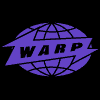
Tell me about watching the Warp label develop over the years and how you guys got involved with it.
Basically when we'd done the three EPs in 1994/95 we were looking to see if a label wanted to pick us up. Because Richard's label Flaw was small and couldn't really take it on really far.
- So Warp was interested in us. Basically it was all hinged on a festival gig at Glastonbury and it just went off fantastically. So on the back of that they signed us. They were very into the sound of the drum kit and the bass, I think. And so we started off with a good relationship with them.
- Warp are brilliant. They are so open minded and up for any sort of experimentation. They are a proper, a true indie label. These days when indie labels aren't indie labels because they've got a huge major above them running things, and they haven't. So it's exciting. And ten years down the line they have produced some of the most ground-breaking and inspiring music, I think. People like Aphex Twin, but also Nightmares On Wax, one of their first signings and the stuff that George has put out I think is brilliant. It's good and hopefully they'll carry on.
- They are moving down to London in November. They've been based in Sheffield all this time, so that will be interesting because I think that will change things a bit. It will make things easier for them because they will be more in touch in everyone. I think, in a way them being in Sheffield, it is almost like, without sounding patronizing, it is almost a provincial idea being nicely removed from the mainstream all the time. We'll see what happens.
- Warp are brilliant. They are so open minded and up for any sort of experimentation. They are a proper, a true indie label. These days when indie labels aren't indie labels because they've got a huge major above them running things, and they haven't. So it's exciting. And ten years down the line they have produced some of the most ground-breaking and inspiring music, I think. People like Aphex Twin, but also Nightmares On Wax, one of their first signings and the stuff that George has put out I think is brilliant. It's good and hopefully they'll carry on.
The one criticism people have of the label is that they don't sign new artists anymore, and they discover artists from other labels, Aphex Twin and yourselves. Are they actually open to signing somebody off a demo?
Oh yeah, they are doing that. They've signed a couple of almost singer/songwriting outfits from Sheffield, Slum and John Callaghan, and they've not had anything out before. They are very unusual, it is like very simple guitar-y songs. So I think they do look for things straight off demo. But you know how it is at the moment, the music industry is fairly tight for cash. And you can release things and sell 1 or 2 thousand copies of a 12" and you're doing pretty well. But how long can you do that? People want more, I think.
Early Warp was known for the "bleep" sound but they also had a breaks and funk side with Nightmares On Wax's 1st album and others, so how did you see the albums in terms of the different styles they have worked with.
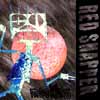
To us, we seem to fit perfectly within that side of it because of the elements of a lot of funk in what we do. There are little bits that we might have done in the past that sound a little bit retro, but at the same time we really want to push things forward, with new technology and so on. And that seems to really fit in with what they do, also. They are just open to experimentation. You know, the question we get asked more than anything is like "why on earth did you go to a label like Warp who does bleep music?" And they don't just do bleep music they do everything. Everything which is unusual and pretty well anything which another label is unlikely to take up, they'll go for. Which is positive I think.
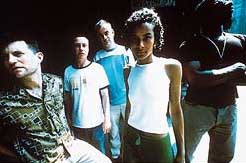
Any new material you are working on?
Yeah, we're working on a new album at the moment in a little studio in Waterloo and we're hopefully going to record that by the end of the year. It is pretty close to being done.
Do you have a name for it?
At the moment the name is Our Aim Is To Satisfy - Red Snapper. A friend of ours, on holiday somewhere, I think it was in Texas, found a diner with a huge neon sign outside saying that. And I don't why it was there or what it was about but he took a photo of it and it seems to suit what we're going through at the moment (laughs).
You recently did remixes of Gus Gus and something for the Melt 2000 label (Jessica Lauren on the Music With No Name 2 comp), anything else that hasn't come out yet?
Yeah, we've done a band called Somatic. We did a mix for Beth Orton's "Inevitable" which will come out at some time. And we did Lamb's "Softly" as well. Yeah we're always up for it and I think we might be doing a few more before the end of the year but they are only in the pipeline.
One remix that I really like is the one you did for Ken Ishii.
Oh, "Circular Motion" yeah, that is one of my favorites that we've ever done. If ever I play out I still try and play that because I think that it is unusual. I'm glad you like that.
I like the threatening guitar line in that one.
Yes, definitely, that is quiet nice.
Warp 10th Anniversary Remixes
Warp-net Red Snapper page
Matador page
Sabres / Weatherall / Red Snapper site